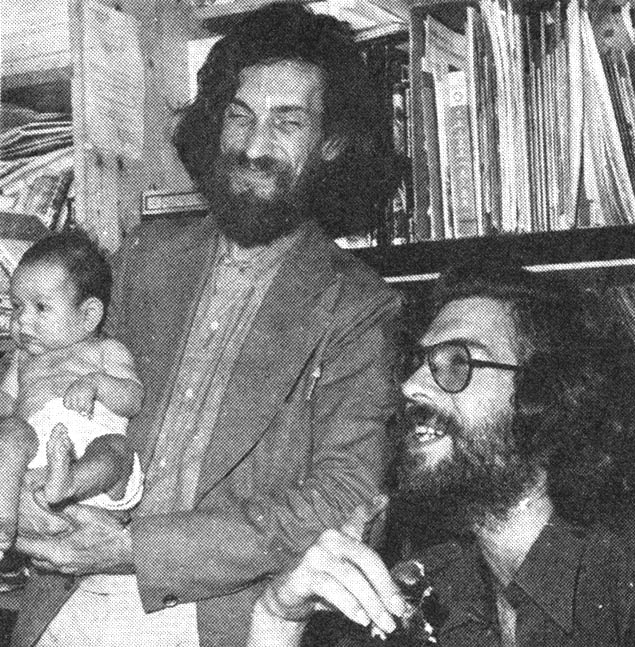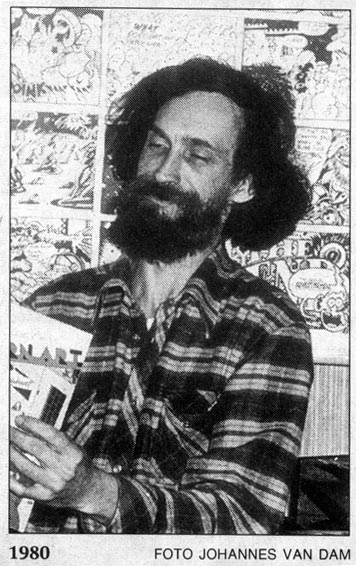Robert Olaf Stoop was a Dutch cartoonist, designer, publisher, comic importer and member of the Provo movement. As co-founder of the Amsterdam-based Real Free Press (1966-1985), he was responsible for introducing American underground comix on Dutch soil. As the creator of one of Europe's first underground comix, the self-published 'Roza's Lotgevallen' (1966), Stoop can be considered a founder of the Dutch alternative comic scene.
Provo members Roel van Duijn, Olaf Stoop, Jaap Beek and Hans Metz, portrayed in De Telegraaf of 24 July 1965.
Early life
Olaf Stoop was born in 1945 in Amsterdam, but spent large parts of his childhood outside of his home country. During his youth, he lived in England, in Indonesia with his grandmother and with a Jewish family in Laren. He grew up to be a full-blooded anarchist, fuelled by the rebellious spirit of the 1960s. He never finished high school and took his first job as a warehouse clerk with the Van Ditmar publishing house. Afterwards, he was salesman at an AKO book stand at Schiphol Airport, a job that lasted only three weeks as Stoop was also a prominent member of the counterculture movement Provo in Amsterdam.
Pamphlet announcing the first issue of Provo (June 1965). The magazine is recommended by Dr. Frankenstein, Dr. Ben Casey (from the TV series 'Ben Casey'), Dr. No (from the 'James Bond' film 'Dr. No'), Dr. Killdare (from the TV series 'Dr. Killdare') and the English-language expression 'Dr. Killjoy' (meaning somebody deliberately destroys all fun).
Provo
In 1965-1967, The Netherlands were shaken up by the Provo movement. The group was founded in Amsterdam by Robert Jasper Grootveld, Roel van Duijn and Rob Stolk, and was known for their provocative but non-violent happenings. Stoop joined them instantly. One of their pamphlets portrayed Claus von Amsberg, the fiancé of Dutch crown princess Beatrix, with the caption "persona non grata". Claus was a German and had been a member of both the Hitler Youth and the Wehrmacht army during World War II. Although these were mandatory memberships for all German children and youngsters at the time, and Claus had always distanced himself from Nazism, he was still accused of being a Nazi sympathizer by many Dutch citizens. For the Provo movement, Claus was the ideal target. In his Schiphol newsstand, Olaf Stoop put this Provo pamphlet between newspaper copies for unsuspecting travelers to find, an action that cost him his job. Nevertheless, it did provide him with enough publicity to become the first Provo member to be interviewed by a national newspaper, namely Algemeen Handelsblad on 29 June 1965.
Stoop also designed posters for the Provo group and wrote articles for their self-titled magazine. In the first issue of Provo, he drew a pamphlet with a couple of "famous" doctors who wholeheartedly recommended the magazine. In August 1966, he abruptly ended his association with Provo, allegedly because one of his articles was refused. Another reason was that Provo steadily transformed into a more professional organization. This disgusted the young man, who refused any concessions. Work by Stoop, mostly hand-lettered pages, also appeared in De Witte Krant (1967-1968) and the anarchist magazine Den Uil from Ghent, Belgium (1968).
Real Free Press
In 1966, Stoop established his own publishing imprint, the Real Free Press, producing pamphlets, comic books and comic magazines, which he distributed through the city by cargo bike. In its early years, Stoop operated the RFP from his houseboat on the river Amstel, while having his mailing address with the Rarekiek trinket shop in the Runstraat. After a while, he was joined by Martin Beumer (1942-1999), a former sports instructor, with whom he started importing American, British and French alternative comic books and rare records. He also provided the distribution of Dutch underground magazines like Desperado and Eindelijk. In 1973, the Real Free Press became a foundation, and relocated to a small shop and office space on the Oude Nieuwstraat 10. The team was reinforced by secretary Ger Lambregts (the owner of the Rarekiek shop) and Henk van der Does. In 1978, the team moved once again to the Dirk van Hasseltssteeg 25. Both locations became a meeting place for fans of alternative comics and drugs, or "the lost connection for solid facts", as Stoop called it.
Roza's Lotgevallen
The first comic publication of the Real Free Press imprint was 'Roza's Lotgevallen Deel 1: Roza's Lot Gevallen?' (1966), an underground comic written and drawn by Stoop himself. Appearing in a print run of 2,000 copies, the publication also featured an extra booklet about drug use. 'Roza's Lotgevallen' is considered the first European underground comic, and initiated the alternative comics scene in the Netherlands.
Olaf Stoop and Martin Beumer of the Real Free Press.
RFP publications
The Real Free Press imprint was associated with the Underground Press Syndicate, an international association of alternative publications, including The East Village Other and Screw, which freely exchanged material. Between November 1968 and April 1974, Stoop and Beumer published six tabloid-size issues of the Real Free Press Illustratie. It reprinted work by the top of the American alternative scene, such as Robert Crumb, Gilbert Shelton, Spain Rodriguez and S. Clay Wilson. Beumer was largely responsible for the translations, while Stoop provided the hand-lettering for the paper's articles about marijuana cooking, Scientology, the Plaster Casters, Tijuana Bibles and Vietnam oil fields. Between 1969 and 1971, the Real Free Press also published four European editions of Wallace Wood's indie comic book Witzend. The RFP publication 'Wipe Out Comics' (1973-1975) was launched to promote the work of Dutch underground artists to an international audience. It contained contributions by Peter Pontiac, Joost Swarte and Bernard Willem Holtrop.
Real Free Press issues #1 and #6. Cover illustrations by Ercola and Robert Crumb
Real Free Press also brought the work of long-forgotten comic artists from the first half of the 20th century back under the attention. In collections like 'Ehé Catl', Stoop and Beumer released book compilations of Winsor McCay's 'Little Nemo in Slumberland' (1969) and 'Dream of the Rarebit Fiend' (1976), Bud Fisher's 'Mutt and Jeff' (1971), Basil Wolverton's 'Powerhouse Pepper' (1973), Gustave Verbeck's 'The Upside-Downs' (1973), George Herriman's 'Krazy Kat' (1974) and George McManus' 'Bringing Up Father' (1975). The cover designs were provided by Joost Swarte, while Flip Fermin did occasional restoration of interior art.
These largely English-language books also became sought-after items overseas. The reprint of 'The Spirit' (1975-1976) led to a rediscovery and reappreciation of Will Eisner, and even prompted the veteran artist's return to comics after years of doing mainly commercial artwork. The subsequent U.S. publication of Eisner's 'A Contract With God' (1978) is considered the launch of the graphic novel as an official comic genre. The Real Free Press additionally published a Dutch edition of 'Monkey Subdues the White Bone-Demon' ('Aap Verslaat De Witte Knekelgeest', 1971), an adaptation by Wang-Hsing-pei of a 16th century Chinese novel by Wu Cheng-en with illustrations by Chao Hung and Chien Hsiao-Tai.
List of publications by the Real Free Press, printed in Ciso Stripgids #10 (July 1976).
Connections
Stoop's Real Free Press had close ties with Kees Kousemaker, who in November 1968 founded Europe's first specialized comics shop in the Amsterdam Kerkstraat and also had a keen eye for underground and alternative comic art. Stoop was also friends with Flip Fermin, a Lambiek employee and artist, who often worked in the RFP's offices on his art projects. Among them were several Real Free Press advertisements, portraying Stoop as the character "Rocktimes Otis", none which however appeared in any of the Real Free Press publications. The Antwerp-based art collective Ercola (consisting of Jean-Claude Block, Jean-Claude Buytaert, Wally van Looy and others) produced their first commissioned artwork for Stoop.
Olaf Stoop was one of the first to recognize the talent of Joost Swarte, and published his work in several forms, such as the 1975 comic book 'De Papalagi', which became famous world-wide, and Swarte's first book collection, 'Modern Art' (1980). Joost Swarte also did most of the design and color separation work for the RFP reprint collections. Another associate was filmmaker Harrie Verstappen, with whom Stoop made a film adaptation of Victor Moscoso's 'Cosmic Comics' (1974). After moving to the Dutch Antilles in 1978, Verstappen established the Real Free Press International Foundation in Curaçao in order to publish and distribute the affiliated artists overseas.
Pamphlet about drug use, hand lettered by Stoop for 'Roza's Lotgevallen'.
Downfall
As a true exponent of Dutch counterculture, drug use was an important part of the Real Free Press' daily operations. Harrie Verstappen jokingly remarked the company was the "only publishing house he knew that ran on dope money." Already in 1970, Olaf Stoop and his wife Midzy spent months in a French prison after being apprehended for drug possession during their honeymoon trip. Stoop and Beumer initially used mainly marijuana, but later switched to cocaine. Production steadily declined, and in the second half of the 1970s most of their comics import market had been taken over by Bill Daley.
In February 1982, Beumer left the company after a dispute with Stoop. He moved to the Spanish isle of Menorca, where he spent the rest of his days doing translation work, hosting radio shows and doing work for the Red Cross. Shortly after Beumer's departure, Stoop also had a falling out with Flip Fermin. By 1985, the Real Free Press had ceased all of its activities.
Final years and death
After his company folded, Olaf Stoop moved into an apartment in the Kerkstraat, living a secluded life. On occasion, he headed out to sell his books in the Amsterdam Vondelpark, or at fairs like the Pasar Malam Besar in The Hague. After years of declining health, he died from a heart attack in 1998, only three days before his 53rd birthday. An intriguing personality, Robert Olaf Stoop lived his whole life as an anarchist and a free spirit.
Olaf Stoop, photographed by Johannes Van Dam, 1980.











